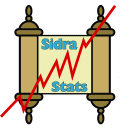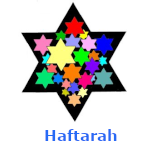BeChuko-Thai
בְּחֻקֹּתַי
Leviticus 26:3 – 27:24
Following the Commandments
If you follow My laws and are careful to keep my commandments, I will provide you with rain at the right time, so that the land will bear its crops and the trees of the field will provide fruit.
There will be so much that your threshing season will last until your grape harvest, and your grape harvest will last until the time you plant. You will have your fill of food, and you will live safely in your land. I will grant peace in the land so that you will sleep without being afraid. I will get rid of dangerous animals in the land, and the sword will not pass through your land (this means there will be no war in the land). You will chase away your enemies, and they will fall before your sword. Five of you will be able to chase away a hundred (of them), and a hundred of you will beat ten thousand (of them), as your enemies fall before your sword.
I will turn to you, making you fertile and numerous, in this way keeping my covenant with you.
You will continue eating the previous year’s crops long after their time, and you will eventually have to clear out the old crops (to make way) for the new.
I will keep My sanctuary among you, and not grow tired of you. I will make My presence felt among you. In this way, I will be HaShem to you, and you will be a nation (dedicated) to Me.
I am HaShem your L-rd. I brought you out from Egypt, where you were slaves. I broke the bands of your yoke and led you out with your heads held high.
And if you do not listen to Me, and do not keep all these commandments. If you come to ridicule My decrees and grow tired of My laws, then you will not keep all My commandments, and you will have broken My covenant.
I will then do the same for you. I will bring upon you feelings of anxiety, along with depression and excitement, destroying your outlook and making life hopeless.
You will plant your crop in vain because your enemies will eat it. I will direct my anger against you that you will be defeated by your enemies, and they will dominate you. You will run away when no one is chasing you.
If you do not listen to Me, I will increase the punishment for your sins times seven. I will break your aggressive pride, making your skies like iron, and your land like brass. You will exhaust your strength in vain, since your land will not yield its crops, and the trees of the land will not produce fruit.
If you are careless toward Me and lose the desire to obey Me, I will again increase the punishment for your sins times seven. I will send the wild animals among you, killing your children, destroying your livestock, and reducing your population, so that the roads will become deserted.
If this is not enough to discipline you, and you are still careless toward Me, then I will also be careless toward you, but I will increase the punishment for your sins again seven times. I will bring a vengeful sword (war of revenge) against you to avenge (get revenge for) My covenant so that you will huddle in your cities. I will send the plague against you, and give you over to your enemies.
I will cut off your food supply so that ten women will be able to bake bread in one oven, bringing back only a small amount of bread. You will eat, but you will not be satisfied.
If you still do not obey Me and remain careless toward Me, then I will be careless toward you with a vengeance, bringing another increase of seven times to your punishment for your sins. You will eat the meat of your sons, and make a meal of the meat of your daughters. When I destroy your altars and smash your sun gods, I will let your corpses rot on the remains of your idols.
I will, in this way, have grown tired of you. I will let your cities fall into ruins, and make your sanctuaries deserted. I will not accept the soothing scent of your sacrifices anymore. I will make the land so deserted that even your enemies who live there will be amazed. I will scatter you among the nations, and keep the sword drawn against you (keep you threatened and warred against). Your land will stay deserted, and your cities in ruins.
Then, as long as the land is deserted and you are in your enemies’ land, the land will enjoy its Shabbatot (Sabbaths). The land will rest and enjoy its sabbatical years. In this way, as long as it is deserted, the land will enjoy the sabbatical rest that you would not give it when you lived there.
I will bring such insecurity to those of you who survive in your enemies’ land, that the sound of a rustling leaf will make them run away in fear of the sword. They will fall with no one chasing them. They will fall over one another as if (chased) by the sword, even when there is no one chasing. You will have no way to stand up in front of your enemies.
You will, in this way, be destroyed among the nations. The land of your enemies will devour you.
The few of you who survive in your enemy’s lands will realize that your survival is threatened as a result of your not being observant. These few will also realize that their survival has been threatened because of their fathers’ not being observant. They will then confess their sins and the sins of their fathers for being false, and remaining careless toward Me. It was for this that I also remained careless toward them, and brought them to their enemies’ land.
But when the time finally comes that their stubborn spirit is made humble, I will forgive their sin. I will remember My covenant (contract) with Jacob as well as My covenant with Isaac and My covenant with Abraham. I will remember the land. Because the land will have been left behind by them and will have enjoyed its Sabbaths while it lay in desertion without them. Amends will have been made for the sin they had committed by ridiculing My laws and growing tired of My decrees. In this way, even when they are in their enemies’ land, I will not become so disgusted with them or so tired of them that I would destroy them and break my covenant with them, since I am HaShem their L-rd. I will, therefore remember the covenant with their original ancestors that I brought out of Egypt in the sight of the nations, so as to be HaShem for them. I am HaShem.
These are the decrees, laws, and codes that HaShem set between Himself and the Israelites at Mount Sinai through the hand of Moses.
HaShem spoke to Moses, telling him to speak to the Israelites and say to them:
This is the law when a person makes a vow to donate to HaShem the donation value of a person.
The donation value of a 20 to 60-year-old male will be 50 shekels according to the sanctuary standard. For a woman, this donation value will be 30 shekels.
For a person between 5 and 20 years old, the donation will be 20 shekels for a male and 10 shekels for a female. For a person between one month and five years old, the donation will be 5 silver shekels for a male and 3 silver shekels for a female.
For a person over 60 years old, the donation will be 15 shekels for a man and 10 shekels for a woman.
If a person is too poor to pay the donation, he will present himself to the priest, so that the priest can determine the donation value. The priest will then make this determination based on how much the person making the promised donation can afford. (Some say that this donation is speaking of a case where a person dedicates himself to HaShem. Talmudic sources, however, say that it is primarily a donation of money.)
If the donation is an animal that can be offered as a sacrifice to HaShem, then anything donated to HaShem automatically becomes sacred. One may not exchange it, or offer a substitute for it, whether the substitute is a better or worse animal. If he replaces one animal with another, both the original animal and the replacement will be made sacred.
If it involves an unfit animal that can not be offered as a sacrifice to HaShem, the owner will present the animal to the priest. The priest will set the donation value according to the animal’s good and bad qualities, and its donation value will be what is determined by the priest. If the owner wishes to buy it back, he must add 20 percent to the donation value. If a person makes his house sacred to HaShem, the priest shall set its donation value according to its good and bad points. The donation value will remain what the priest determined. If the owner wants to buy back the house, he has to add 20 percent to its donation value, and then it goes back to being his.
If a man makes a field from his inherited property sacred to HaShem, its donation value will be calculated according to the amount of seed required to plant it, 50 silver shekels for every chomer (equal to 220 liters, or 58 gallons, this is equal to 168,750 square feet, or 3.87 acres) of barley seed.
This is the donation value that must be paid if the field is made sacred immediately after the jubilee year (every 50th year is the jubilee year, a year in which fields are not planted). However, if one makes his field sacred to HaShem later after the jubilee, then the priest will calculate the donation value based on how many years remain until the next jubilee year, and the donation value will be reduced.
If the person who has made his field sacred to HaShem wants to buy it back he must add 20 percent to the donation value and then it returns to him.
However, if he does not buy back the field, or if the sanctuary treasurer sells it to someone else, it can no longer be bought back. When the field is then released by the jubilee, it becomes sacred to HaShem, like a field that has been declared forbidden, and then it becomes the inherited property of the priest.
If the field that one makes sacred to HaShem is not his inherited property, but a field he has bought, the priest will calculate the amount of its donation value on the basis of the number of years left until the next jubilee year. On that day, anyone can buy it back by giving its donation value as something made sacred to HaShem. In any case, during the jubilee year, the field will return to the person from whom it was bought, the one who had it as his inherited property.
Every donation value will be according to the sanctuary standard, where the shekel is 20 gerahs. (This value is explained in Exodus 30:13.)
A firstling animal (an animal that is in the first litter, or is the first-born) that must be sacrificed as a first-born offering to HaShem, may not be made sacred to HaShem by an individual. Whether it is an ox, sheep or goat, it automatically belongs to HaShem.
If a non-kosher animal is made sacred, it will be bought back for its donation valuation plus 20 percent. If it is not redeemed, it will be sold for its donation value.
However, anything forbidden that a person declares to be forbidden to HaShem cannot be sold or bought back. This is true of anything he owns, whether it is a (non-Jewish) slave, an animal, or his inherited field. Everything that is forbidden is holy of holies to HaShem. If a human being is declared forbidden, he can not be bought back and must be put to death. The lands’ duty, whether of the crops, of the soil, or of the fruit of trees, belong to HaShem, and are therefore made sacred to HaShem. If a person wishes to buy back such duties, he must add 20 percent.
All duties of the herds and flocks will be given when they are counted under the rod, with every tenth being made sacred to HaShem. No distinction may be made between better and worse animals and no substitutions may be made. If a substitution is made, then both the original animal and the replacement will be made sacred and not available to be bought back. These are the commandments the HaShem gave Moses for the Israelites at Mount Sinai.
Haftarah Connection

Jeremiah 16.19-17.14
In this week’s Parsha HaShem tells us that when we follow his commandments he will bless the land and make it plentiful, however, if we fail to follow his commandments we will be punished.
In the Haftara the Prophet Jeremiah reminds us that we must follow HaShem’s commandments. He compares man to a tree. If we rely on only man then we are like a tree in the desert without water, but a tree planted near water grows and flourishes like those who cling to HaShem’s ways.
Sidra Stats

- Thirty-Third of 54 Sedras in the Torah
- Written on 131 lines in the Sefer Torah
- 78 P’sukim (verses)
- 1,013 words
- 3,992 letters
Next week’s Parashat: Bemidbar


